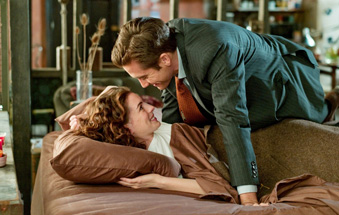Movie Review: Love and Other Drugs
By Matthew Huntley
December 2, 2010
BoxOfficeProphets.com

It tries to be all these things but doesn’t quite go the distance with any of them, and so we’re left with an olio of themes and genres that don’t quite mix or play off one another to become fully realized or memorable. Instead of making us feel liberated, touched or filled with laughter, we’re left feeling unaffected, awkward and taken for a ride.
The movie stars Jake Gyllenhaal as Jamie Randall (Jake Gyllenhaal), a med school dropout with attention deficit disorder who thinks he may be better suited as a salesman. We see he’s a natural when he charms the pants off customers (almost literally) at an electronic store. He’s soon fired but his financially successful brother (Josh Gad) gets him an interview with the giant pharmaceutical company, Pfizer. Jamie attends a three-week training course to become a drug rep before heading out into the field with his nerve-prone supervisor, Bruce (Oliver Platt). Jamie’s first assignment: schmooze doctors and get them to prescribe Pfizer’s patented anti-depressant, Zoloft.
One of the doctors (Hank Azaria) lets Jamie masquerade as an intern, which leads him to Maggie Murdock (Anne Hathaway), a 26-year-old Parkinson’s patient who also takes Prozac. That gives Jamie the chance to tell her Zoloft has fewer side effects. He also sneaks a peek at her chest when she asks the doctor about a strange mark on her breast. When Maggie discovers he’s a fraud and beats him over the head, Jamie can’t stop thinking about her (she’s the only girl who’s ever rejected him). He gets her number from the receptionist and calls her up for coffee, after which the two surrender to passionate sex with no strings attached.
Maggie makes it clear she doesn’t want a relationship and tells Jamie he’s not allowed to keep a change of clothes at her apartment or introduce her to his parents. It’s all just sex. She’s already been down the road where her boyfriend runs away because he’s too afraid to commit to a sick person. That, in turn, has made her afraid of getting close to anyone.
But, as the story inevitably goes, Jamie and Maggie start to fall in love with each other anyway, no matter how much they don’t want to admit it. At a Chicago drug convention, Jamie talks with a man whose wife has Parkinson’s and it suddenly dawn on him how difficult and exhausting it will be to care for someone with a disease. This realization, of course, comes immediately after Maggie listens to the testimonies of other Parkinson’s patients and is thrilled to learn just how normal their lives are. It’s also right before Maggie admits she loves Jamie. What perfect timing.
From then on, Jamie makes it his mission to look for the best care and doctors money can buy, even though it’s clear he’s doing it for himself and not Maggie. This is followed by the age-old moment where everything comes crashing down and the movie tries to instill doubt that the couple might not live happily ever after.
Some viewers may wonder if Love and Other Drugs exploits Parkinson’s patients for dramatic effect, and the answer, ultimately, is no, although it comes close. There’s a particularly shameful scene when Maggie handles a pair of scissors and it plays out like a horror movie: will she cut herself and spill blood? But the movie is careful not to undermine the disease and does take the time to show its effects. However, these scenes only come in short bursts and we never get the idea it wants to tell us anything about the disease we don’t already know. It only wants to skim the surface and not get in the way of the contrived love story.
What the movie does exploit is all the romantic and raunchy clichés we’ve come to expect from the genre but which no longer affect us. This goes especially for the American Pie-type moments, as when Jamie has sex with another employee in the stock room of the electronic store and her cell phone accidentally dials her boyfriend so he can listen in on their debauchery. I also didn’t laugh at the rather extraneous scene when Jamie attends a pajama party and is force-fed his company’s latest miracle drug, Viagra (the movie begins in 1996), only to get an erection that won’t go down. The whole predicament doesn’t have much of a payoff and I wondered what the point of it was other than attempted humor. By this point, though, the movie had already crossed the line of trying to be more earnest than crude.
The thing about Love and Other Drugs is it acts like it has all these points - both amusing and dramatic - to make about the medical industry, love, commitment, etc., but it doesn’t have the courage or know-how to make them in a clear way. Did the filmmakers even know what they wanted to say? Their movie just meanders from one genre and theme to another until it reverts to a purely auto-pilot conclusion, spearheaded by a most contrived scene - when Jamie stumbles onto a tape where Maggie talks about “living in the moment,” or something like that, and races after her bus heading that’s heading to Canada for cheaper medicine.
After that, the usual pieces fall into place and all is right with the world. But it’s only right in Jamie and Maggie’s fictitious world. The movie’s insinuated points and arguments about the real world are tossed aside and we leave the theater not feeling affected or more learned than when we went in. The only thing we got out of it was a conventional romance, and that we’ve seen before.